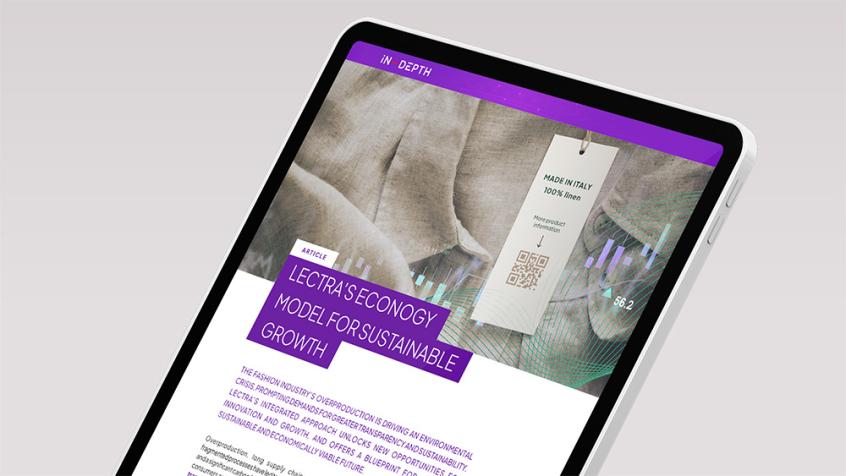Meeting the moment
Why fashion’s long-term future relies on finding a better way to create, manufacture, market, and more – starting today.

The future of fashion: Embracing transformation for sustainable growth
 The fashion industry stands at a critical juncture, facing unprecedented disruptions that demand immediate action. The convergence of digital transformation, sustainability imperatives, and evolving consumer expectations necessitates a reevaluation of how brands create, manufacture, and market their products.
The fashion industry stands at a critical juncture, facing unprecedented disruptions that demand immediate action. The convergence of digital transformation, sustainability imperatives, and evolving consumer expectations necessitates a reevaluation of how brands create, manufacture, and market their products.
To thrive, stakeholders must begin their journey of transformation today, anchored in robust technology strategies and collaborative partnerships.
The fashion sector is no stranger to change
Historically, the fashion sector has exhibited remarkable adaptability, successfully navigating major shifts from industrialization to the rise of e-commerce. However, the current state of the industry reveals a stark reality: traditional practices are misaligned with the fast-paced, digitally-driven landscape.

The fashion industry is at a decisive turning point where embracing digital transformation and sustainability is no longer an option but a necessity.
Yann Rivoallan, President of Fédération Française du Prêt à Porter Féminin
Fragmented value chains and disjointed teams clash with the demands of agile digital disruptors, urging brands to adopt innovative production strategies and embrace omnichannel, community-driven approaches to competitiveness and responsibility.
A fundamentally different world
The impending transformation—termed a "time of reckoning" by recent research—reflects complex changes that will significantly alter the fashion industry.
In navigating this shift, established brands must swiftly adapt to once-secure market positions, which are being threatened by fast-moving, digital-native entrants. These competitors redefine consumer expectations around speed, availability, and pricing, making it vital for brands to "identify new competitive advantages," as highlighted by industry analyst Ben Hanson.
This urgency underscores the importance of developing agile supply chains capable of responding to dynamic consumer demands efficiently.

A rising bar for sustainability
Sustainability is no longer a peripheral consideration; it has become a cornerstone of operational strategy. Complicated regulations concerning environmental impacts impose a critical challenge for fashion companies. The introduction of digital product passports emphasizes the need for transparency in product origins and impacts, compelling brands to align their practices with heightened ethical standards.

Sustainability is, first and foremost, about business survival.
Victoire Satto, Founder and CEO of The Good Goods
To achieve long-term success, fashion companies must meld sustainability with their economic objectives, integrating ecological awareness into daily practices.
How fashion became so fragmented
Fashion’s value chain is inherently complex and fragmented, encompassing numerous disconnected elements.
This complexity poses significant challenges for brands seeking to streamline operations and foster collaboration. Large brands, often handling diverse product categories, face difficulties ensuring standardization across distinct departments. To maximize efficiency, it is essential to integrate technology that enables a seamless flow of data across the entire value chain.
The solution shift: from output to outcome
Many brands have historically viewed technology as a means to increase output rather than leveraging it to drive strategic outcomes.
As the industry evolves, there is a growing recognition that successful digital transformation necessitates a broader perspective that transcends immediate profit margins.

For several years now, technology decisions have been framed as choices about how to improve individual tasks and increase output, instead of as opportunities to positively change strategic business outcomes – and this now has to change.
Maximilien Abadie, Chief Strategy Officer and Chief Product Officer at Lectra
Companies must embrace a holistic view that prioritizes informed decision-making facilitated by centralized, accurate data.
Fashion leaders are reimagining their technology adoption strategy, utilizing advancements like AI, digital twins, and advanced manufacturing to redefine their business models.

Sustainability, speed, and cost are often seen as conflicting priorities, but we strongly believe they can be addressed in tandem—and technology plays a central role in that.
Shakthi Ranathunga, Chief Operating Officer of MAS Holdings
Digital transformation across fashion’s core domains: create, manufacture, and market better
Lectra’s solutions facilitate intelligent decision-making, streamline design processes, optimize production methods, and enhance market visibility.
Based on extensive experience in the fashion market, Lectra has developed a comprehensive portfolio of solutions that not only address specific processes but also enable overall transformation across the extended value chain.
This holistic approach is crucial in today’s rapidly changing environment, where agility and responsiveness are key.
By interlinking these three core domains—Create, Manufacture, and Market—Lectra is not only enhancing the individual processes within the fashion value chain but is also paving the way for a more connected and efficient operational framework. This comprehensive integration allows brands to harness data’s full potential, enabling better decision-making, increased agility, and, ultimately, a more sustainable future for the fashion industry.

Lectra emphasizes that the essential components of the fashion value chain—Create, Manufacture, and Market—must interconnect to allow seamless data flow, creating a cohesive product lifecycle.
With the challenges faced by fashion players today, it simply will not work for a brand to focus only on improving the way they create products without also elevating the way they manufacture and market them.
Maximilien Abadie
A call to action for the Fashion industry
Fashion’s future hinges on the industry's ability to adapt to profound changes. To maintain relevance, companies must invest in transforming their approaches to creation, manufacturing, and marketing. This requires a commitment to building resilience, agility, and interconnectedness within the supply chain, making real-time insights indispensable for success.
As noted by Shakthi Ranathunga, “These insights drive innovation and product development, enabling faster market delivery.”
 By leveraging technology and adopting innovative business models, brands can navigate the challenges of today while laying the groundwork for sustainable growth. As the industry grapples with complex transformations, the path forward lies in collaboration, data-driven decision-making, and an unyielding dedication to sustainability.
By leveraging technology and adopting innovative business models, brands can navigate the challenges of today while laying the groundwork for sustainable growth. As the industry grapples with complex transformations, the path forward lies in collaboration, data-driven decision-making, and an unyielding dedication to sustainability.
The time to act is now. As the fashion industry faces its most transformative moment, the call for a better way to create, manufacture, and market products resonates louder than ever. Stakeholders must embrace this moment as an opportunity, one that promises to redefine the future of fashion, enhance competitiveness, and prioritize responsible practices.
Read the white paper
Discover how you can position your brand at the forefront of this critical change and ensure a sustainable and profitable future.



